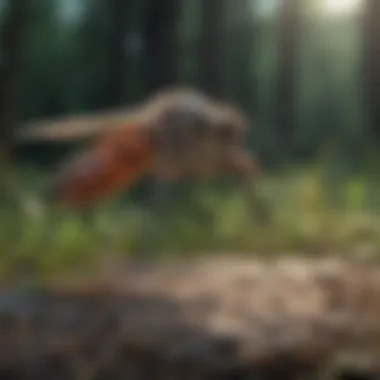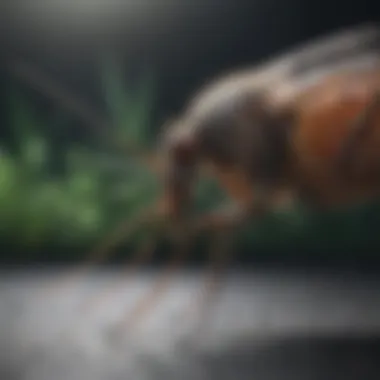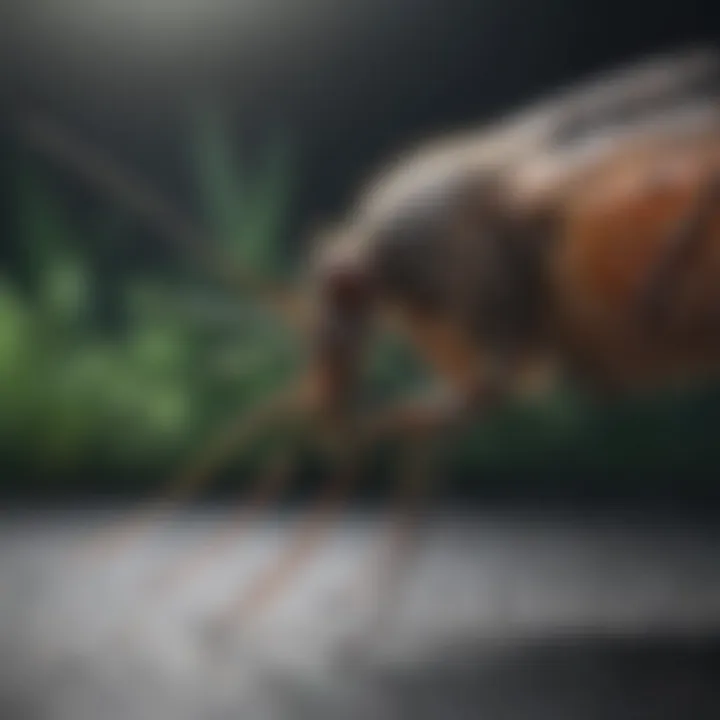The Ecological and Scientific Importance of Mosquitoes


Intro
Mosquitoes often evoke strong negative feelings due to their role in transmitting diseases and causing discomfort through bites. However, their contribution to ecosystems and scientific research is often overlooked. These insects offer essential insights into biodiversity and environmental dynamics, which can deepen our understanding of ecology and public health. Recognizing their significance requires a shift in perspective, moving beyond the stereotype of mosquitoes as merely pests.
Article Overview
Purpose of the Article
This article aims to illuminate the complex ecological and scientific roles that mosquitoes play. By examining specific functions within ecosystems, it endeavors to provide a balanced view of these insects. Additionally, it seeks to highlight the implications of mosquitoes in various research areas, including climate science, medical research, and evolutionary biology.
Relevance to Multiple Disciplines
The significance of mosquitoes extends far beyond entomology. Their interactions within ecosystems connect them to disciplines like:
- Environmental Science: Understanding their role in food webs and habitat dynamics.
- Public Health: Studying mosquito vectors in the spread of diseases like malaria and dengue.
- Evolutionary Biology: Analyzing adaptations and species interactions over time.
- Climate Studies: Assessing how changing climates affect mosquito populations and behaviors.
This multi-disciplinary relevance underscores the necessity for comprehensive research on mosquitoes.
Research Background
Historical Context
The relationship between mosquitoes and humans has been complex and longstanding. Historically, mosquitoes have been implicated in major disease outbreaks, shaping global health policies and public attitudes toward them. Despite their adverse impacts, ecological studies began to reveal the multifunctional role these insects play in various environments as early as the 20th century. Researchers are now exploring how the decline or alteration of mosquito populations can significantly impact ecosystems and species diversity.
Key Concepts and Definitions
Understanding mosquitoes' ecological and scientific significance involves familiarizing oneself with certain key concepts:
- Biodiversity: Mosquitoes contribute to a number of ecological niches and food webs. Their larvae serve as food for fish, while adult mosquitoes are preyed upon by birds and bats.
- Vectors: As vectors, mosquitoes transmit pathogens between hosts, making them crucial in studying disease dynamics and transmission pathways.
- Ecosystem Functions: This term describes the roles that organisms play in maintaining ecological processes, such as nutrient cycling and population regulation.
Through this exploration, we will uncover the deeper implications of mosquitoes in our ecosystems and research disciplines, ultimately fostering a more nuanced view of their presence on Earth.
Prelude to Mosquitoes
Mosquitoes, often perceived solely as pests, play crucial roles in ecosystems and have implications for scientific research. Understanding their biological characteristics and habitats establishes a foundation for appreciating their ecological significance. This section examines the intricacies of mosquitoes' biology and diversity, shedding light on their contributions beyond being mere nuisances.
Overview of Mosquito Biology
Mosquitoes belong to the family Culicidae and are characterized by their slender bodies and long legs. Their life cycle comprises four stages: egg, larva, pupa, and adult. Each stage exhibits unique adaptations and vulnerabilities. Typically, mosquitoes spawn in stagnant water, where larvae develop, feeding on organic material. The duration of each stage can vary significantly based on environmental conditions. Adult mosquitoes primarily feed on nectar, but females require blood meals for egg development. This necessity drives them to seek out hosts, including humans and animals.
Hormonal responses in mosquitoes regulate various behaviors related to feeding and reproduction. The sensory organs play a vital role in locating hosts by detecting carbon dioxide and body heat. In addition to these adaptations, mosquitoes exhibit geographic variations in their biology, influenced by habitat and climate. Understanding these biological frameworks is essential to grasp mosquito behavior and their impacts on ecosystems.
Species Diversity and Habitat
Mosquitoes thrive in diverse habitats, including wetlands, forests, and urban areas. There are over 3,500 species of mosquitoes worldwide, with notable discrepancies in their distribution and ecological roles. Specific species are known for their abilities to withstand varying climates. For example, the Aedes aegypti mosquito flourishes in tropical and subtropical environments, often exploiting human-altered landscapes.
Their adaptability to different habitats supports a wide range of ecological interactions. Some species prefer brackish waters, while others inhabit freshwater sources. The distribution of mosquitoes is influenced by various factors such as temperature, rainfall, and the presence of suitable breeding sites. Moreover, the coexistence of multiple mosquito species in a single habitat can enhance ecosystem functionality by fostering interactions with other organisms.
"Understanding the ecological roles and variations among mosquito species is crucial for effective management and conservation efforts."
"Understanding the ecological roles and variations among mosquito species is crucial for effective management and conservation efforts."
In summary, mosquitoes are not only significant for their role as disease vectors but also for their vital contributions to ecosystems. Through their biological characteristics and habitat diversity, these insects illustrate the complexity of ecological networks. Addressing these points lays the groundwork for a detailed exploration of their roles in food webs and scientific research.
The Role of Mosquitoes in Ecosystems
Understanding the role of mosquitoes within ecosystems goes beyond viewing them merely as pests. They contribute significantly to the dynamics of different ecological systems. Their presence indicates a healthy environment and they also sustain various species through different functions. Recognizing this complexity can alter our perceptions and enhance our strategies for management and conservation.
Food Source for Other Species


Mosquitoes serve as an essential food source for numerous organisms. Bats, birds, amphibians, and other insects rely on mosquitoes as a vital part of their diet. For instance, the common house mosquito, Culex pipiens, is a frequent meal for various bird species during the summer months. These connections illustrate their significance in maintaining the balance of food webs.
Moreover, larvae of mosquitoes inhabit aquatic environments, where they become an important food resource for fish and other aquatic organisms. This predation helps regulate mosquito populations but also supports the growth of species that depend on them. The interdependence between mosquitoes and other species is a vital aspect of ecological health.
- Key Points about Mosquitoes as Food Sources:
- They are a preferred food for many bat species, enhancing nocturnal biodiversity.
- Chironomids, commonly known as non-biting midges, compete with mosquitoes but do not fulfill the same ecological roles, emphasizing mosquitoes' unique placement in the ecosystem.
- Larval stages are significant for fish, ensuring aquatic species thrive.
Contribution to Pollination
In addition to serving as a food source, mosquitoes play a role in pollination, although their effectiveness may vary compared to other insects. Certain species, such as the Toxorhynchites genus, feed on nectar and inadvertently transfer pollen from one plant to another, promoting plant reproduction. This role, while often overlooked, underscores their contribution to biodiversity.
Interestingly, female mosquitoes require sugars for energy, leading them to visit various flowers. As they seek nectar, they facilitate pollination. A greater understanding of this function can inform conservation efforts, particularly for plants that rely on these insects.
Mosquitoes' interactions with plants reveal their importance in ecological networks, supporting the growth of diverse flora, which in turn sustains entire ecosystems.
Mosquitoes' interactions with plants reveal their importance in ecological networks, supporting the growth of diverse flora, which in turn sustains entire ecosystems.
- Key Points about Mosquitoes and Pollination:
- They contribute to plant reproduction by transferring pollen.
- Nectar feeding helps sustain their life cycle while supporting plant biodiversity.
- The loss of mosquito populations can affect plant species that rely on them for successful pollination.
Overall, mosquitoes have intricate relationships with various species within their ecosystems. This understanding enhances our perspective, leading to better management and conservation strategies that consider the interconnected roles these insects play.
Mosquitoes in the Food Chain
Mosquitoes play a critical role in the food chain, acting as both prey and predator in various ecosystems. Their presence contributes significantly to the balance of energy flow within food webs and facilitates biological interactions among different species. Understanding the dynamics of mosquito populations is essential for appreciating their ecological significance.
Prey and Predator Dynamics
Mosquitoes serve as prey for many animals, including birds, bats, amphibians, and some larger insects. Their lifecycle stages, such as larvae and adults, offer different nutritional opportunities for predators. The larvae inhabit aquatic environments, making them accessible to fish and other water-dwelling creatures. This accessibility fosters a robust predator-prey relationship, which is vital for regulating both mosquito populations and their predators.
- It is estimated that certain species of bats can consume thousands of insects, including mosquitoes, in a single night. This predation pressure not only helps to control mosquito populations but also promotes the health of fish populations that compete for the same resources.
- Likewise, mosquito adults provide an energy source for various insectivorous birds, thus underlining their importance in terrestrial ecosystems. As a result, many mosquito species are integral to the nutritional needs of these predators, highlighting the interconnectedness of food webs.
Role in Aquatic Food Webs
Within aquatic ecosystems, mosquito larvae occupy a unique niche. They feed on organic matter, algae, and bacteria, contributing to nutrient cycling within water bodies. This feeding behavior positions them as important players in maintaining the health of these ecosystems.
The presence of mosquito larvae can enhance water quality by controlling algae populations. In some cases, they also serve as indicators of environmental health. For instance, an abundance of mosquito larvae may signal rich nutrient levels in the water, prompting deeper investigations into aquatic health.
- Some species of mosquito larvae are consumed by fish, which in turn impacts the predator fish populations. This relationship is adaptive; mosquito larvae grow in nutrient-rich environments that support larger populations of fish, thereby ensuring a stable food source for both.
- Additionally, changes in water quality and temperature can affect mosquito and predator dynamics. This reflects a broader impact of environmental factors on food webs, tying the fate of mosquitoes inextricably to the health of aquatic habitats.
Mosquitoes, often seen merely as nuisances, are an essential part of food chains. They help support predator populations and facilitate nutrient cycling in aquatic environments. Their ecological role should not be underestimated.
Mosquitoes, often seen merely as nuisances, are an essential part of food chains. They help support predator populations and facilitate nutrient cycling in aquatic environments. Their ecological role should not be underestimated.
Overall, mosquitoes have a multifaceted and significant role within food chains. By supporting a variety of predators and contributing to nutrient processes in aquatic systems, they emphasize the complexity and interdependence of biological ecosystems.
Scientific Research and Mosquitoes
Understanding mosquitoes from a scientific standpoint is crucial for various reasons. Not only do these insects serve as vectors for diseases, but they also play significant roles in understanding ecological systems and evolutionary biology. Their impact on public health through the transmission of viruses and parasites makes them a focal point for epidemiological studies. Research on mosquitoes can lead to improved methods for controlling population numbers, reducing disease transmission, and enhancing our overall understanding of disease dynamics.
Vectors of Disease: Importance in Epidemiology
Mosquitoes are infamous for their role in disease transmission, affecting millions of people worldwide. They carry pathogens such as the ones causing malaria, dengue fever, Zika virus, and West Nile virus. Understanding the epidemiology of these diseases is imperative for public health.
- Disease Transmission: The study of how these insects spread diseases involves looking at their life cycles, breeding habitats, and feeding behaviors. Knowledge gained from this research can inform prevention strategies.
- Disease Dynamics: Researchers investigate how environmental factors influence mosquito populations and their capacity to spread diseases. For example, climate variables can impact breeding sites and survival rates, which is crucial for predicting outbreaks.
- Developing Vaccines and Treatments: Studies involving mosquitoes also lead to advancements in vaccine development. Understanding vector biology can identify ways to disrupt the transmission cycles, ultimately aiming to decrease disease incidence.
In summary, the role of mosquitoes as vectors of disease makes them significant in epidemiological research, leading to better health strategies and control measures.


Genetic Studies and Evolutionary Insights
The biology and genetics of mosquitoes provide valuable insights into evolution and species adaptation. Studying the genetic diversity among various mosquito species helps scientists understand evolutionary processes and ecological relationships.
- Genetic Variation: Genetic studies reveal how different populations adapt to varying environments. This adaptability can influence disease transmission patterns.
- Gene Flow and Speciation: Research into gene flow among mosquito species offers insight into how new species emerge and how existing populations respond to environmental pressures.
- Biotechnological Applications: Genetic research may lead to biocontrol methods, like genetically modifying mosquitoes to reduce their populations or suppress their ability to transmit diseases.
"By understanding the genetic architecture of mosquitoes, researchers can devise new strategies for controlling their populations in a manner that is less harmful to the environment."
"By understanding the genetic architecture of mosquitoes, researchers can devise new strategies for controlling their populations in a manner that is less harmful to the environment."
Overall, research focusing on the genetic aspects of mosquitoes not only enhances our understanding of biodiversity and evolution but also facilitates the development of innovative solutions in disease control.
Mosquito Behavior and Adaptations
Feeding Habits and Selectivity
Understanding mosquito feeding habits is crucial to recognizing their role in the ecosystem and studying their impact. Notably, only female mosquitoes feed on blood, which they require for egg production. Male mosquitoes, on the other hand, primarily feed on nectar and other sugar sources. This difference is significant as it illustrates the selective nature of mosquito feeding behavior.
Female mosquitoes use several mechanisms to identify suitable hosts. They are attracted to carbon dioxide, heat, and body odors. Once they locate a host, they land and use their specialized mouthparts, called a proboscis, to extract blood. This behavior influences the dynamics of the ecosystem because it establishes interactions between mosquitoes and various animal species.
Moreover, the selectivity of blood meals can impact disease transmission. Different species of mosquitoes prefer different hosts. For example, Aedes aegypti predominantly bites humans, while Culex pipiens may feed more on birds. This specificity influences the spread of vector-borne diseases, as some mosquitoes can transmit pathogens more effectively than others based on their feeding preferences. Consequently, understanding these feeding habits is vital for vector control strategies and public health measures.
Reproductive Strategies
Mosquito reproduction strategies are complex and vary among species, further contributing to their ecological significance. Female mosquitoes mate just once, but they can store sperm for multiple egg-laying cycles. This ability allows them to maximize reproductive success even when mates are scarce. After mating, a female will seek a blood meal to nourish her eggs. Once she has fed, she will go to a suitable breeding site, usually stagnant water, to lay her eggs.
Egg-laying can occur in various environments, such as marshes, ponds, or even artificial containers. The choice of breeding sites often reflects the adaptability of mosquito species. For instance, Aedes mosquitoes can thrive in small water sources, while Anopheles mosquitoes often require larger bodies of water.
The eggs laid by females can remain viable in a dormant state for months in unfavorable conditions. This strategy ensures population resilience against environmental variations. Such adaptations allow mosquitoes to survive in diverse habitats and ensure their proliferation despite challenges in their environments.
In summary, both feeding habits and reproductive strategies of mosquitoes demonstrate their ecological importance and role in disease dynamics. Research into these areas can contribute to more effective controls and management strategies.
Impact of Climate Change on Mosquito Populations
Climate change has profound implications for ecosystems globally, influencing not only biodiversity but also species distribution and behavior. Mosquitoes are particularly susceptible to these changes. Understanding the impact of climate change on mosquito populations is essential for predicting their roles in disease transmission, ecological balance, and overall public health.
Shifts in Distribution
One significant consequence of climate change is the alteration of mosquitoes' geographical distribution. Warmer temperatures can expand the regions where mosquitoes thrive. For example, as average temperatures rise, many formerly temperate zones become hospitable environments for species like Aedes aegypti and Anopheles gambiae, both known for transmitting diseases such as dengue fever and malaria.
- Temperature Ranges: A critical factor affecting mosquitoes is temperature. The optimal temperature for many mosquito species is between 20 °C and 30 °C. Beyond this range, they may face increased mortality rates.
- Habitat Expansion: Areas that experience increased humidity and temperature might support larger mosquito populations. This expansion can lead to new regions being affected by mosquito-borne diseases, previously unheard of in those areas.
- Urbanization and Climate Interplay: Urban areas amplify the heat effect. This phenomenon, combined with climate change, creates ideal breeding habitats for mosquitoes, further spreading their reach.
These shifts in distribution necessitate the need for updated epidemiological models and public health strategies to mitigate the potential health risks associated with these changes.
Changes in Life Cycle and Behavior
The life cycle and behavioral patterns of mosquitoes are also in flux due to climate change. Alterations in environmental factors such as temperature, precipitation, and humidity affect their breeding and feeding behavior.
- Life Cycle Acceleration: Warmer temperatures can shorten the mosquito life cycle. This acceleration leads to more generations within a given time period, increasing the chances of disease transmission.
- Feeding Habits: Changes in weather patterns may influence mosquito feeding and host seeking behavior. For example, some species may become more aggressive in seeking blood meals during warmer periods, leading to higher transmission rates of pathogens.
- Breeding Habitats: Improper rainfall and increased flooding contribute to more standing water, creating optimal breeding environments for mosquitoes. Understanding these shifts in breeding behavior helps public health officials focus their control efforts more effectively.
It is vital to consider how climate change is reshaping the ecological framework that governs mosquito populations and their impact on human health.
It is vital to consider how climate change is reshaping the ecological framework that governs mosquito populations and their impact on human health.
In summary, the implications of climate change on mosquito populations are considerable. Shifts in distribution and changes in life cycles and behaviors present critical challenges that require ongoing research and proactive management strategies. Doing so allows society to better prepare for and respond to the associated health risks.
Cultural and Economic Significance of Mosquitoes
Mosquitoes are often viewed narrowly through the lens of disease transmission, yet they hold rich cultural and economic significance. Understanding these aspects is essential for a more holistic perspective on their role in human society and ecosystems.


Mosquitoes in Traditional Medicine
In various cultures, different parts of the mosquito have been used in traditional medicine. Mosquito larvae are sometimes utilized in folk remedies. They are believed to possess properties that can help with some ailments. In some rural areas, crushed mosquito exoskeletons may be applied to minor wounds for their purported antiseptic qualities. Furthermore, certain species of mosquitoes are noted in ethnomedicine for carrying specific biological markers that indicate environmental health. This connection between mosquitoes and medicinal practices demonstrates their underestimated value and highlights the ongoing need to explore these relationships.
"Traditional medicinal knowledge often encapsulates ecological wisdom, showing the vital connections between natural organisms and healthcare practices."
"Traditional medicinal knowledge often encapsulates ecological wisdom, showing the vital connections between natural organisms and healthcare practices."
Mosquito Management and Industry
The economic impact of mosquitoes extends beyond health concerns. Mosquito abatement industries are critical in managing population levels to reduce the spread of diseases like dengue and malaria. These industries deploy various technologies and strategies for effective mosquito control, contributing to local economies. Pesticides, traps, and innovative solutions, such as genetic control methods, are all part of this significant sector.
Moreover, the presence of mosquitoes can actually stimulate other economic activities. For instance, many regions offer eco-tourism opportunities centered around biodiversity, highlighting local wildlife, including mosquitoes. In this context, mosquitoes, while viewed negatively, play a role in environmental education and promote awareness about ecosystem balance.
In summary, the cultural and economic implications of mosquitoes are diverse and complex. Recognizing their roles in traditional medicine and economic management broadens our understanding and appreciation of these insects beyond their reputation as mere pests.
Conservation and Mosquito Management
Conservation and mosquito management are essential in addressing the intricate balance between controlling mosquito populations and maintaining ecological integrity. Mosquitoes play significant roles in ecosystems, and understanding their ecological function is crucial for developing effective conservation strategies. While the public perception focuses primarily on their role as vectors for diseases, such as malaria and dengue, there is a broader picture that considers their ecological contributions. Well-planned mosquito management can lead to healthier ecosystems while reducing negative impacts on human health.
Effective management strategies must focus on integrating scientific research with ecological considerations. One of the key points is the need for public awareness and education regarding the ecological roles of mosquitoes. By spreading knowledge about the benefits and ecological importance of mosquitoes, communities can achieve a more balanced approach to mosquito management.
Integrated Pest Management Strategies
Integrated Pest Management (IPM) is a systematic approach to controlling mosquito populations while minimizing environmental impact. This strategy combines various control methods that are environmentally sound and economically feasible. The main components of IPM include:
- Monitoring and Surveillance: Regular monitoring of mosquito populations helps identify trends and assess the effectiveness of control measures. Tools such as traps, genetic testing, and field surveys provide valuable data.
- Biological Control: Utilizing natural predators, such as fish and bats, can help control mosquito populations without relying on chemical treatments. This strategy fosters biodiversity and can be more sustainable long-term.
- Cultural Control: Altering human behaviors and practices can reduce mosquito breeding grounds. Community efforts to eliminate standing water, proper waste management, and sustainable landscaping can significantly decrease available habitats for mosquitoes.
- Chemical Control: When necessary, the prudent use of pesticides may be applicable. However, it is essential to select products that are less harmful to other wildlife and the environment.
IPM encourages collaboration among local government, communities, and researchers to achieve a comprehensive strategy focused on long-term solutions rather than short-term fixes.
Balancing Mosquito Control with Biodiversity
Striking a balance between effective mosquito control and biodiversity conservation is crucial. While controlling mosquito populations is important for public health, indiscriminate or overzealous applications of control measures can lead to unintended ecological repercussions. Some crucial considerations include:
- Ecosystem Health: Mosquitoes contribute to food webs. Eliminating them entirely can disrupt predator-prey relationships and lead to declines in species dependent on them.
- Pollination: Certain mosquito species are pollinators, and their removal can negatively affect plant reproduction. Understanding the contributions of these species can help guide conservation efforts.
- Habitat Conservation: Protecting natural habitats helps maintain ecological balance. Preservation of wetlands, for example, supports a variety of species, including mosquito populations while offering other ecological benefits.
"Conservation is not only about saving specific species, but also about understanding the intricate web of life where each plays a role."
"Conservation is not only about saving specific species, but also about understanding the intricate web of life where each plays a role."
In summary, conservation and mosquito management necessitate a nuanced approach. Encouraging methods like Integrated Pest Management can support both public health efforts and ecological integrity. Achieving this balance requires robust community engagement and ongoing research into the complex relationships within ecosystems.
Closure
The examination of mosquitoes reveals their complex roles within ecosystems and their contributions to scientific research. In the context of this article, it is crucial to reassess the perception of mosquitoes as merely vectors of disease. Instead, their ecological and evolutionary significance must be acknowledged.
Reassessing the Mosquito's Role
Mosquitoes are often viewed through a negative lens due to their ability to transmit various diseases such as malaria, dengue fever, and Zika virus. However, they perform vital functions in the ecosystems they inhabit. They serve as a food source for numerous species, including birds, bats, and other insects. These interactions establish a balance within food webs, a factor often overlooked. Additionally, mosquitoes contribute to pollination. While many people associate pollination with large animals like bees and butterflies, mosquitoes also play a role in this process, aiding in the reproduction of certain flowering plants.
Recognizing these aspects is essential for conservation efforts. An overly aggressive approach to mosquito control can result in the unintended consequence of harming other species that rely on mosquitoes for sustenance, thereby disrupting the balance of local ecosystems. This understanding guides more informed management strategies that protect both human health and biodiversity.
Future Directions in Research and Management
Moving forward, there is a need for continued research into the ecological roles of mosquitoes and their interactions within various environments. Studies can focus on the impact of differing mosquito species on local ecosystems and how climate change affects their behavior and population dynamics. By honing in on these areas, researchers can better understand mosquitoes' ecological functions versus their roles as disease vectors.
In terms of management, innovative approaches that integrate pest control with ecological preservation need to emerge. This might involve developing targeted strategies that minimize the impact on non-target species while controlling mosquito populations, perhaps through the use of biological control methods or environmentally friendly insecticides. An interdisciplinary approach that includes ecologists, epidemiologists, and public health experts will be crucial.
In summary, the significance of mosquitoes extends beyond disease transmission. Through a careful reassessment and a commitment to continued research, it is possible to navigate the complexities involved in mosquito management while enhancing ecological health and scientific understanding.
"Mosquitoes are not foes to be eliminated, but intricate players in our world's ecological tapestry."
"Mosquitoes are not foes to be eliminated, but intricate players in our world's ecological tapestry."
- The ecological significance of understanding mosquitoes and their behaviors is a crucial aspect of biodiversity conservation.



